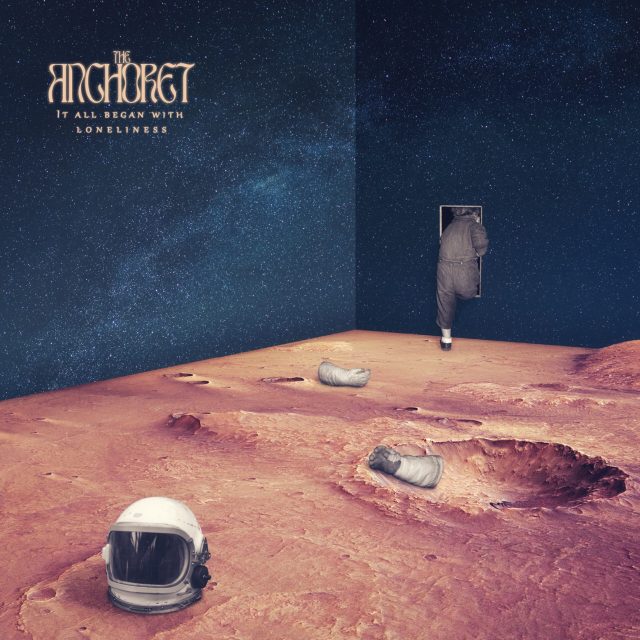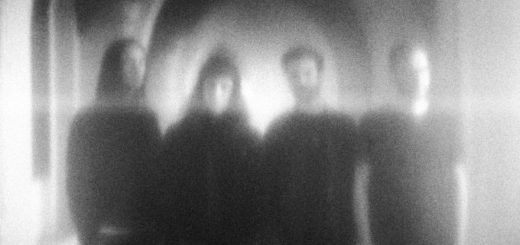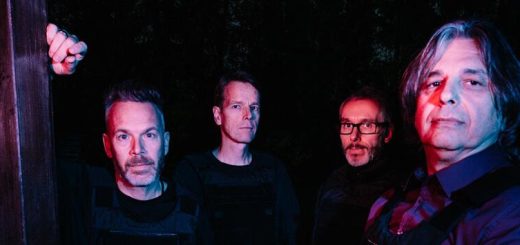The Anchoret: ‘It All Began With Loneliness’ Review

The album artwork for It All Began With Loneliness
There is a risk with ‘project’ albums such as this that the band feels incohesive due to their lack of experience working together and that the music feels like a by-the-numbers amalgamation of the musicians’ main bands, leaving the project feeling half-baked and uninspired. However, The Anchoret comfortably avoid falling into this trap in their debut effort. Bassist and composer Eduard Levitsky has selected a list of collaborators clearly chosen for their compatibility for the project and its material rather than for their musical box office recognition. He has also put together a collection of songs that present a fresh take on the progressive genre.
Prior to release, the band had expressed fears that their music would be perceived as either not heavy enough or not prog enough but it is their unconventional mix of the classic prog of the 70s with extreme metal elements that provides The Anchoret with a sound that is distinctive from their peers.
One of the prime examples of how this combination manifests itself in the material is the solo section in Unafraid. It demonstrates the band’s capability to blend their 70s prog influences through the incorporation of the flute with the kind of shredding guitar that Dream Theater built their reputation on. The inclusion of additional instrumentation such as the saxophone, clarinet and the aforementioned flute feels natural rather than gimmicky, and the gospel vocals performed by Nimiwari on A Dead Man really elevate the song’s climax. As with many sections of the album, it’s easy to see where the inspiration for this moment may have come from (in this case Pink Floyd classic The Great Gig in the Sky springs to mind) but the band always keep these moments on the right side of the divide between homage and plagiarism.
Turning to the heavier side of the band’s inspirations, Someone Listening?’s direct and dramatic opening bears before everything drops back to allow a menacing guitar riff to take centre stage, with the band soon kicking things into a higher gear once again. Throughout the album, the band utilises some of the language of extreme metal, including blast beats and the occasional screamed vocal, but not to the extent that it should put off prog fans who are usually averse to such things, especially since the production smooths out these harsher edges. The Anchoret balances melancholic tension with these heavier moments of release to create a rewarding sense of catharsis for the listener as they follow the band on a journey through their musical landscapes.
The member of the collective that readers are most likely to be familiar with is Andy Tillison, the mastermind behind The Tangent, who handles keyboard duties here but uncharacteristically does not have any compositional credits. However, his presence is still very much felt in instances such as the opening synth lead of All Turns to Clay. All of the musicians get similar moments to shine throughout the album, with the mid-section of Forsaken featuring some thunderous drums courtesy of James Christopher Knoerl.
Although it is lacking a major highlight in the form of either a towering epic or a snappy single, this is a solid album that benefits from being taken in as a whole. The album flows well, with the near-seamless transition between A Dead Man and Until the Sun Illuminates mirroring the feeling of a live performance. Whilst not exactly repetitive, the songs may benefit from having a little more stylistic variety as the material rarely feels unpredictable. The album’s mix seems best suited to allowing the songs’ moodier moments to shine whilst the heavier sections seem somewhat muted in comparison. However, these criticisms are only minor concerns when compared to how enjoyably refreshing The Anchoret’s take on the genre is and hopefully, this album will not end up as a one-and-done project like many similar releases. It would be a real shame to miss the opportunity to develop the chemistry brewing between the musicians and the ideas presented in this proof of concept for melding classic prog with the more extreme end of the metal spectrum.









